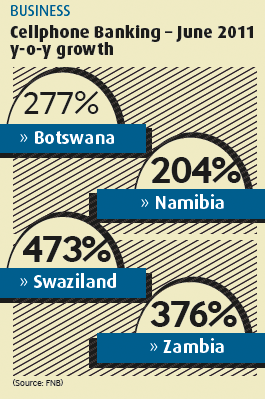|

Today, mobile phones are used by large cross sections of the populations of most countries. They have become an essential tool for both practical and social purposes. In Africa, mobile phones are now playing a huge role in a very significant area: the banking sector.
The introduction of mobile phones has changed the entire continent. Access to financial tools, something that was previously just a dream for millions of people in rural Africa, has now become a part of daily life.
Mobile banking, also known as M-Banking, has become indispensable to Africans for three main reasons. First, mobile phones have taken the continent by storm in the last 10 years. According to the African Development Bank, in 1998 there were fewer than 2 million mobile phone users in Africa. This number grew to more than 400 million by 2009. By 2012, the number of mobile phone users in Sub-Saharan Africa rose to 475 million, compared to just 12.3 million fixed line connections, representing the highest proportion of mobile phones to land line connections in the world[i].
Second, a large proportion of Sub-Saharan Africa has yet to be integrated into a traditional banking system. A 2009 World Bank report states that as many as 70 percent of Africans do not have access to banks, and South Africa's First National Bank (FNB) estimates that 13 million out of South Africa's over 50 million citizens do not use banks[ii].
And third, Sub-Saharan Africa is primarily made up of rural communities that lack basic banking facilities. For the banking sector, access to millions of new customers was made possible by the introduction of mobile phones to communities and households.
This remarkable turnaround is clearly seen in Kenya, which has led the way in banking, through Kenya's M-PESA. Launched in 2007, the service now serves more than 14 million customers (more than 70 percent of the country's adult population) and is widely regarded as Africa's most successful mobile banking model. With an agent outlet base of 28,000, M-PESA processes more transactions domestically within Kenya than Western Union does globally. This phenomenon is also present in other countries. According to FNB estimates, subscribers in Botswana, Namibia, South Africa and Zambia make a total of 1.2 million mobile banking transactions per month, moving an estimated $14 million.
Mobile banking provides financial solutions to millions of families and communities in rural areas. It is an easy way to transfer money, especially when more and more families depend on money earned by relatives working in urban areas or abroad. It is also a relatively safe way to transfer money. Previously, money would be moved by individuals using public transport to travel long distances, risking that their funds might be stolen. Today, rural families can retrieve money at any local pick-up point without anyone having to stuff cash into suitcases or pockets.
But perhaps most importantly, mobile banking allows banks and customers to work with relatively small sums. Previously, people wanting to take out a small loan or transfer a small amount of money had to rely on unofficial channels. This left them vulnerable to loan sharks and high interest rates. In addition, banks missed the opportunity to serve a large number of clients. In other words, mobile banking has given rural communities the tools needed to work with the banking sector.
Current projections suggest that mobile banking will continue to expand and play a large role in Africa as the continent keeps developing, with more economic growth increasing demand for banking services. Both rural populations and the banking sector owe a great debt to a small device that has bridged the gap between these two groups, allowing both to grow. CA
(The writer is Communications Manager of EMRC – an internationally renowned organization providing a platform for Africa's private and public sector to come together and discuss partnership opportunities )
[i]http://www.africareview.com/Business---Finance/Mobile-phone-users-increase-in-Africa/-/979184/1619056/-/wdlrcw/-/index.html
[ii]http://www.bizcommunity.com/Article/410/78/70701.html
|